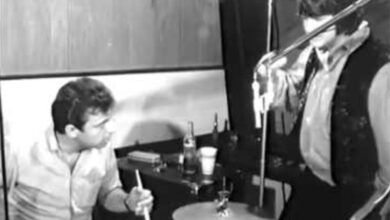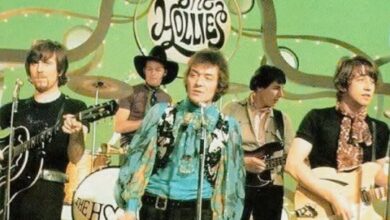Roy Orbison mesmerized the audience with a stunning performance of “Oh, Pretty Woman” during his legendary Black White Night concert.
In the vast tapestry of rock and roll, few tracks shimmer as brightly as Roy Orbison’s *“Oh, Pretty Woman.”* Released in 1964, this timeless anthem not only highlighted Orbison’s hauntingly rich vocals but also crystallized the spirit of its era. Decades later, its magnetic charm persists, weaving itself into the fabric of global culture and proving that great music transcends generations.
The song’s origin story is steeped in spontaneity. One afternoon, as Orbison’s wife, Claudette, prepared to leave their home, he casually asked if she needed cash. Before she could reply, co-writer Bill Dees quipped, *“A pretty woman never needs any money.”* That fleeting exchange ignited a creative spark. Within 40 minutes, Orbison and Dees had penned a melody that would echo through history—a blend of playful swagger and soulful yearning.
The recording session on August 1, 1964, at Nashville’s Fred Foster Sound Studio was nothing short of alchemy. Guitarist Billy Sanford’s opening riff—a cascade of twangy notes—became the song’s heartbeat, instantly recognizable and impossible to forget. Orbison’s vocal performance, meanwhile, oscillated between velvety croons and raw, guttural growls, punctuated by an improvised *“Mercy!”* that electrified the track. Every note was meticulously crafted, yet felt effortlessly alive.
*“Oh, Pretty Woman”* exploded onto charts worldwide, claiming the #1 spot on the Billboard Hot 100 for three weeks and topping the UK Singles Chart. It sold over seven million copies, a staggering feat that underscored its universal resonance. The song’s success wasn’t just commercial—it became a cultural phenomenon, soundtracking dances, road trips, and late-night radio dreams.
For Orbison, the track marked a career zenith. Born in 1936 in Vernon, Texas, he honed his craft early, forming the band *The Wink Westerners* as a teenager. But it was his partnership with Monument Records in the early 1960s that catapulted him into stardom. Hits like *“Only the Lonely”* and *“Crying”* showcased his operatic range and knack for channeling heartache into art, earning him the nickname *“The Caruso of Rock.”*
While *“Oh, Pretty Woman”* diverged from Orbison’s usual melancholic themes, its upbeat rhythm and cheeky lyrics revealed his versatility. The song’s protagonist—a smitten observer chasing a mysterious beauty—felt both cinematic and relatable, a testament to Orbison’s storytelling genius. This shift proved he could master joy as deftly as sorrow, securing his relevance amid the British Invasion’s rising tide.
Tragedy, however, loomed over Orbison’s life. In 1966, Claudette died in a motorcycle accident, a loss that shattered him. Three years later, a house fire claimed two of his sons, Tony and Roy Jr. Orbison channeled his grief into music, but the weight of these losses seeped into his later work, adding layers of poignancy to his already emotive style.
Despite personal turmoil, Orbison’s influence never waned. His fusion of rockabilly, operatic flourishes, and narrative lyricism inspired artists across genres. Bruce Springsteen once described Orbison’s voice as *“a cry from the shadows,”* while k.d. lang cited him as a pivotal force in her own artistic journey. His ability to balance vulnerability with power became a blueprint for emotive rock.
The 1990 film *Pretty Woman* reignited interest in the song, introducing it to a new generation. Julia Roberts and Richard Gere’s on-screen romance, set against Orbison’s anthem, transformed the track into a symbol of romantic aspiration. This revival wasn’t mere nostalgia—it reaffirmed the song’s timelessness, proving its adaptability to shifting cultural moods.
Institutional accolades followed. The Grammy Hall of Fame inducted *“Oh, Pretty Woman”* in 1999, celebrating its artistic and historical significance. The Rock and Roll Hall of Fame later included it among the *“500 Songs That Shaped Rock and Roll,”* a nod to its role in defining the genre’s emotional and structural contours.
Orbison’s 1987 induction into the Rock and Roll Hall of Fame honored a career marked by innovation and resilience. His posthumous album *Mystery Girl*, released in 1989, became a critical and commercial triumph, featuring collaborations with icons like Bono and Jeff Lynne. It was a bittersweet coda to a life cut short by a heart attack in 1988, yet it underscored his enduring relevance.
The song’s magic lies in its alchemy of simplicity and depth. Its structure—a four-chord progression paired with Orbison’s dynamic vocals—creates a narrative that’s both specific and universal. Listeners project their own stories onto its framework, whether recalling youthful infatuations or fleeting urban encounters. This duality ensures its place in collective memory.
Orbison’s sartorial signature—dark sunglasses, black attire—mirrored the contrasts in his music: light and shadow, joy and sorrow. He became an enigmatic figure, a quiet rebel whose artistry spoke louder than persona. This mystique only deepened his allure, making him a subject of fascination long after his passing.
Today, *“Oh, Pretty Woman”* remains a staple at weddings, films, and retro playlists. Cover versions by artists like Van Halen and Al Green testify to its adaptability, yet none replicate Orbison’s original alchemy. Its riff is a cultural shorthand for mischief and romance, instantly evoking smiles and toe-taps.
In an age of fleeting trends, the song’s endurance is a testament to Orbison’s genius. It bridges eras, inviting grandparents and grandchildren to share a dance. Its lyrics—simple yet evocative—remind us that love, in all its forms, is both universal and deeply personal.
Roy Orbison’s legacy is etched not just in awards or sales figures, but in the collective heartbeat of music lovers. *“Oh, Pretty Woman”* isn’t merely a song—it’s a shared memory, a whispered secret, a rallying cry for joy. As long as hearts beat and feet tap, its magic will endure, a monument to the man who turned pain into poetry and fleeting moments into forever anthems.





